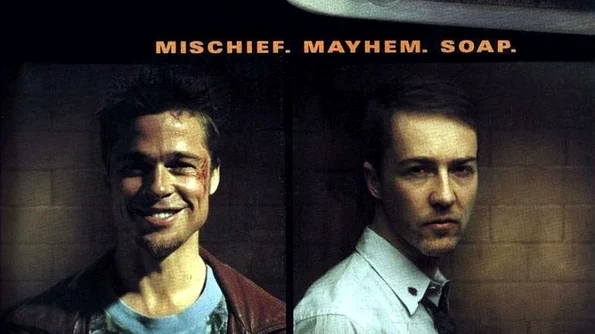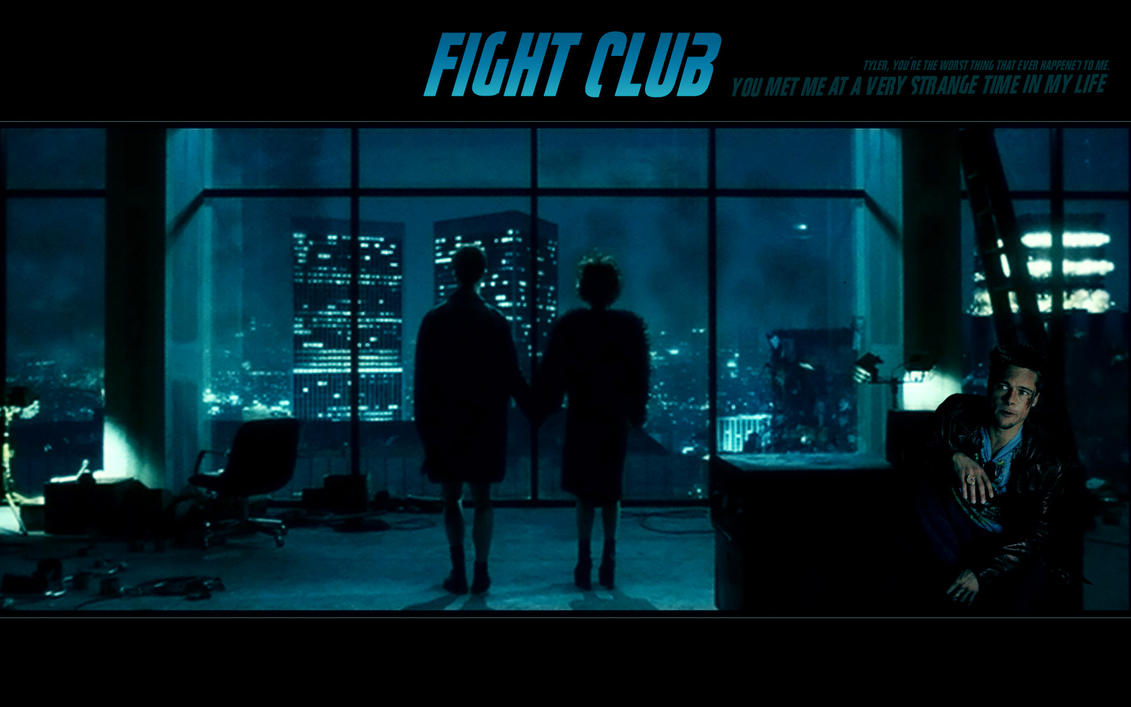
Fight Club - "I Am Jack's Smirking Revenge"
What about Fight Club again? What is there left to say about it when I am bombarded with quotes and pictures from it every single day on Facebook or any other social media? It is, after all, a movie where people fight each other. What’s so special about it?You wonder as you read the title of this article. So I say bear with me and read what I think makes it great, even amazing.
Naturally, you are right that it is a film where people beat themselves and the others up in the most physical sense possible. But also, not so physical. What we get to see – the fight club – where men of all ages come to release their pent up anger is nothing but the materialization of their frustrations and of the less-than-desired situations they had to put up with days, weeks and even years on end. The bodily and facial wounds which translate into the rejection of the traditional esthetical prejudices are the physical scars of the anger that burst open from inside them. The hurt is the ultimate physical manifestation of the inside pain. Yes, it is maybe an unfortunate outlet you would say. But, it is not a praise or plea for violence or aggression against the others or yourself! The physical hurt consumed so much of their energies, attention and unloaded their frustrations that it was actually beneficial.

Fight club wasn't about winning or losing. It wasn't about words.
We're the middle children of history, man. No purpose or place. We have no Great War. No Great Depression. Our great war is a spiritual war. Our great depression is our lives. We've all been raised on television to believe that one day we'd all be millionaires, and movie gods, and rock stars, but we won't. And we're slowly learning that fact. And we're very, very pissed off.
Tyler Durden
It is extreme, you would say and you would most likely be right in your assessment. But isn’t it ironic that only another type of pain would do away with the other one? -It's only after we've lost everything that we're free to do anything -Only something so hurtful and destroying would be able to wash away the soul’s complications, fears, frustrations and unfulfilled desires. That’s the message that Chuck Palahniuk tried to get across with the dystopia that is Fight Club. Only by completely challenging the prejudices and stereotypes that society imposed on us, that we grew up with, thus changing the way we look at things, are we able to live our life to our fullest potential. When we stop worrying of how people see us, of what they think of us or what they think we should do, that is the moment when we are truly free. That is the moment when our real life starts or, at least, that is what Palahniuk thinks. But is this true or even remotely true?
Man, I see in Fight Club the strongest and smartest men who've ever lived. I see all this potential, and I see it squandered. God damn it, an entire generation pumping gas, waiting tables – slaves with white collars. Advertising has us chasing cars and clothes, working jobs we hate so we can buy shit we don't need.
After fight club, everything else in your life gets the volume turned down.
Tyler Durden
Do we actually have to lose everything? Or do we need to set our house on fire like Tyler Durden did to understand that we do not live by society’s pre-set rules, we do not live to satisfy society’s paradigm of what a person should be, but for what we want? What Chuck Palahniuk is also trying to make his readers realize is that peer pressure is a trap and that the only thing which matters is to channel our inner self. It is similar to Dr. Seuss’s thinking that it is a mind over matter issue: Be who you are and say what you feel, because those who mind don't matter and those who matter don't mind.
So, yes, I believe Palahniuk is right, but in the sense that we have to totally alter our perceptions of life, not that we actually have to set on fire our furniture, even if it is from Ikea and it is just like everybody else’s. But, the key to this is to realize that our possessions do not define us. Never. Yes, you may want that big house with umpteenth rooms and a pool or that very expensive car and what not, but the life that you bring in your house matters, not how massive it is. It is important the type of relationship you are able to build with people, not with how many. Yet, you do need to do something and to be paid some money for it, in order to make ends meet, because again society – we, I guess – was not able to create a better system for people to live in.
Like everyone else, I had become a slave to the IKEA nesting instinct.
You are not your job, you're not how much money you have in the bank. You are not the car you drive. You're not the contents of your wallet. You are not your fucking khakis. You are all singing, all dancing crap of the world.

Yet, do not fall completely into it, do not let it poison your heart and break down your self-esteem, because you do not have everything theysay you should have, in order to be happy, fulfilled and alive. Palahniuk creates a dystopia where the main unnamed character has an alter ego – Tyler Durden – who does everything he is afraid to. Thanks to Durden, the ego leads the life he feels he should. In order to translate this into a movie, David Fincher thought it was best to cast both Edward Norton and Brad Pitt to play the character and its alter-ego, respectively. To the viewer who had never read the book, the movie is confusing until they realize that Norton’s and Pitt’s characters represent different sides to the same person: the one that people get to see every day and the one he really is – wild, ambitious, not afraid to do whatever he wants, uninhibited by society and its rules. But the question is, do we have to create another version of ourselves which will be “freed” only at specific moments in time? Or can we be whole, can we be ourselves, all the time?
Narrator: What do you do for a living?
Tyler Durden: Why? So you can pretend like you're interested?
Lou:Reject the basic assumption of civilization, especially the importance of material possessions.
It is also important and interesting that Palahniuk did not name his character and thought of it as male. By not having a name, one could gather the idea that the book is addressed to everybody who has not felt at ease living in a materialistic and money obsessed society. So, the narrator from David Fincher’s movie could be anyone of us telling the story of our own life. Secondly, by choosing a male character, Palahniuk tried to tell a truthful story to which he could add from his experience of living his life as a man. However, he does enter the controversial realm of the misogynist so-called “battle of the sexes” and even makes his character say that “We're a generation of men raised by women. I'm wondering if another woman is really the answer we need.”Reclaiming one’s manhood or manliness quality cannot begin like that or by effectively eliminating women from one’s life.
Narrator:I am Jack's inflamed sense of rejection.
And this is what he found out with Marla whose character is played by Helena Bonham Carter. Even though he described the relationship with her as “If I did have a tumor, I'd name it Marla”, in the end, the narrator found himself in the position to say that “You met me at a very strange time in my life”, since he eventually developed feelings for Marla. She might not have saved him, but whereas the film is concerned, she was there when he wanted to commit suicide, but instead and thanks to her, he managed to annihilate the voice in his head. In the end of the book, however, the narrator actually dies. Ironic and sad, isn’t it? The man who embarked on a journey to rescue his life, to make it more “real”, to turn it to his favour and to stop being a copy did not manage to do so in the end, but instead, was he himself absorbed completely back into the world that he was trying to get out of. Hopefully, this will not be the destiny of everybody who tries to reach out and get out of the cave (myth of the cave).

Narrator:When people think you're dying, they really, really listen to you, instead of just...
Marla: instead of just waiting for their turn to speak?
Narrator: Tyler, I'm grateful to you;for everything that you've done for me. But this is too much. I don't want this.
Tyler Durden:What do you want? Wanna go back to the shit job, fuckin' condo world, watching sitcoms? Fuck you, I won't do it.
Fight Club is a very interesting book-and also, the movie adaptation – which will leave you reflecting on what counts in your life, on what you really want, where you are and what you want to be. Palahniuk asks the most important questions in life and manages to find some of the answers. Yet, inspired by him, we have to find them on our own. Most likely, our journey will not be complete without it. So, I think, in the end, you did manage to find what is special about Fight Club:that it makes you realize you have to question everything you know and to lead your life according to your own rules.















